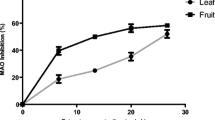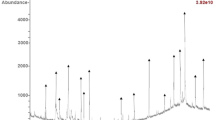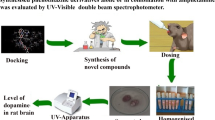Abstract
Nicotiana tabacum, Datura stramonium, and Carica papaya are plants that are on the high trend as substitutes to conventional psychoactive substances due to their legality and the difference in the experiences they offer. The present study was aimed at comparing the neuromodulatory and toxicological potentials of the afore-named plants to an illicit psychoactive plant, Cannabis sativa. Consequently, the effects of the alkaloid extract of the plants were evaluated on critical neuronal enzymes of the monoaminergic, cholinergic, and purinergic (sodium/potassium adenosine triphosphatase (Na+/K+-ATPase), ecto-5’-nucleotidase [eNTDase], and ecto-nucleoside triphosphate diphosphohydrolase [E-NTPDase]) systems of neurotransmission, reactive oxygen species (ROS) production, and lipid peroxidation in rat brain tissue homogenate ex vivo. Plants’ alkaloids were prepared by solvent extraction method. Results revealed that the extracts inhibited the enzymes in a concentration-dependent manner. However, C. sativa had the highest inhibition of monoamine oxidase (MAO), eNTDase, and E-NTPDase activities, while D. stramonium had the highest cholinesterase and Na+/K+-ATPase activity inhibition, and ROS production and lipid peroxidation. In conclusion, D. stramonium altered critical neuronal enzymes significantly more than the illicit plant of abuse, while Nicotiana tabacum showed no significant difference in comparison to C. sativa. Therefore, the use of these plants as drugs should be discouraged.









Similar content being viewed by others
References
Adefegha SA, Omojokun OS, Oboh G, Fasakin O, Ogunsuyi O (2015) Modulatory effects of ferulic acid on cadmium-induced brain damage. J Evid Based Complement Altern Med. https://doi.org/10.1177/2156587215621726
Ademiluyi AO, Ogunsuyi OB, Oboh G (2016a) Alkaloid extracts from Jimson weed (Datura stramonium L.) modulate purinergic enzymes in rat brain. Neuro Toxicol 56:107–117. https://doi.org/10.1016/j.neuro.2016.06.012
Ademiluyi AO, Ogunsuyi OB, Oboh G, Agbebi OJ (2016b) Jimson weed (Datura stramonium L.) alkaloid extracts modulate cholinesterase and monoamine oxidase activities in vitro: possible modulatory effect on neuronal function. Comp Clin Pathol 25:733–741. https://doi.org/10.1007/s00580-016-2257-6
Baggio S, Deline S, Studer J, Mohler-Kuo M, Daeppen JB, Gmel G (2014) Routes of administration of cannabis used for nonmedical purposes and associations with patterns of drug use. J Adolesc Health 54(2):235–240. https://doi.org/10.1016/j.jadohealth.2013.08.013
Colović MB, Vasic VM, Avramovic NS, Gajic MM, Djuric DM, Krstic DZ (2015) In vitro evaluation of neurotoxicity potential and oxidative stress responses of diazinon and its degradation products in rat brain synaptosomes. Toxicol Lett 233(1):29–37. https://doi.org/10.1016/j.toxlet.2015.01.003
Cunha-Oliveira T, Rego AC, Oliveira CR (2008) Cellular and molecular mechanisms involved in the neurotoxicity of opioid and psychostimulant drugs. Brain Res Rev 58 (1):192–208
da Silva AC, Balz D, de Souza JDA, Morsch VM, Corrêa MC, Zanetti GD (2006) Inhibition of NTPDase: 50-nucleotidase, Na+/K+-ATPase and acetylcholinesterase activities by subchronic treatment with Casearia sylvestris. Phytomed 13(7):509–514
de LoresArnaiz GR, Ordieres MGL (2014) Brain Na+, K+-ATPase activity in aging and disease. Int J Biomed Sci 10(2):85
Feng L-Y, Battulga A, Han E, Chung H, Li J-H (2017) New psychoactive substances of natural origin: a brief review. J Food Drug Anal 25(3):461–471. https://doi.org/10.1016/j.jfda.2017.04.001
Fiske CH, Subbarow Y (1925) The colorimetric determination of phosphorus. J Biol Chem 66(2):375–400
Panigrahi GK, Verma N, Singh N, Asthana S, Gupta SK, Tripathi A, Das M (2018) Interaction of anthraquinones of Cassia occidentalis seeds with DNA and Glutathione. Toxicol Rep 5:164–172. https://doi.org/10.1016/j.toxrep.2017.12.024
Graziano S, Orsolini L, Rotolo MC, Tittarelli R, Schifano F, Pichini S (2017) Herbal highs: review on psychoactive effects and neuropharmacology. Curr Neuropharmacol 15:750–761. https://doi.org/10.2174/1570159X14666161031144427
Harborne JB (1998) Phytochemical methods: a guide to modern techniques of plant analysis, 3rd edn. Chapman and Hall, London, p 302
Hasin DS, O’Brien CP, Auriacombe M, Borges G, Bucholz K, Budney A, Compton WM, Crowley T, Ling W, Petry NM, Schuckit M, Grant BF (2013) DSM-5 criteria for substance use disorders: recommendations and rationale. Am J Psychiatry 170(8):834–851
Herraiz T, Chaparro C (2005) Human monoamine oxidase is inhibited by tobacco smoke: β-carboline alkaloids act as potent and reversible inhibitors. Biochem Biophys Res Comm 326(2):378–386. https://doi.org/10.1016/j.bbrc.2004.11.033
Heymann D, Reddington M, Kreutzberg GW (1984) Subcellular localization of 5-nucleotidase in rat brain. J Neurochem 43:971–978. https://doi.org/10.1111/j.1471-4159.1984.tb12832.x
Marisco PC, Carvalho FB, Rosa MM, Girardi BA, Gutierres JM, Jaques JA, Salla APS, Pimentel VC, Schetinger MRC, Leal DBR, Mello CF, Rubin MA (2013) Piracetam prevents scopolamine-induced memory impairment and decrease of NTPDase, 5′-nucleotidase and adenosine deaminase activities. Neurochem Res 38:1704–1714. https://doi.org/10.1007/s11064-013-1072-6
Oboh G, Ademosun AO, Ogunsuyi OB, Oyedola ET, Olasehinde TA, Oyeleye SI (2018) In vitro anticholinesterase, antimonoamine oxidase and antioxidant properties of alkaloid extracts from kola nuts (Cola acuminata and Cola nitida). J Complement Integr Med 16:1–12. https://doi.org/10.1515/jcim-2016-0155
Ogunmoyole T, Adeyeye RI, Olatilu BO, Akande OA, Agunbiade OJ (2019) Multiple organ toxicity of Datura stramonium seed extracts. Toxicol Rep 6:983–989. https://doi.org/10.1016/j.toxrep.2019.09.011
Ohkawa H, Ohishi N, Yagi K (1979) Assay for lipid peroxides in animal tissues by thiobarbituric acid reaction. Anal Biochem 95:351–358
Parle M (2011) Papita fruit: a delicious remedy for depression. Int J Res Ayurveda Pharm 2(4):1358–1364
Perry NS, Houghton PJ, Theobald A, Jenner P, Perry EK (2000) In-vitro inhibition of human erythrocyte acetylcholinesterase by Salvia lavandulaefolia essential oil and constituent terpenes. J Pharm Pharmacol 52(7):895–902. https://doi.org/10.1211/0022357001774598
Rodrigues SR, Caldeira C, Castro BB, Gonçalves F, Nunes B, Antunes SC (2011) Cholinesterase (ChE) inhibition in pumpkinseed (Lepomis gibbosus) as environmental biomarker: ChE characterization and potential neurotoxic effects of xenobiotics. Pestic Biochem Physiol 99(2):181–188. https://doi.org/10.1016/j.pestbp.2010.12.002
Schetinger MRC, Morsch VM, Bonan CD, Wyse AT (2007) NTPDase and 5’- nucleotidase activities in physiological and disease conditions: new perspectives for human health. Biofactors 31(2):77–98. https://doi.org/10.1002/biof.5520310205
Senger MR, Rico EP, de Bem Arizi M, Rosemberg DB, Dias RD, Bogo MR (2005) Carbofuran and Malathion inhibit nucleotide hydrolysis in zebrafish (Danio rerio) brain membranes. Toxicology 212(2):107–115. https://doi.org/10.1016/j.tox.2005.04.007
Turski W, Turska E, Grossbell M (1973) Modification of the spectrophotometric method of the determination of monoamine oxidase. Enzyme 14:211–220
Ujváry I (2014) Psychoactive natural products: overview of recent developments. Ann 1st Super Sanità 50(1):12–27
World Drug Report (2015) Vienna, UN Office on Drugs and Crime, 2015 (https://www.unodc.org/unodc/en/frontpage/2015/June/2015-world-drug-report-finds-drug-use-stable--access-to-drug-and-hiv-treatment-stilllow.html. Accessed 11 Dec 2015)
Wyse AT, Streck EL, Barros SV, Brusque AM, Zugno AL, Wajner M (2000) Methylmalonate administration decreases Na+, K+-ATPase activity in cerebral cortex of rats. Neuroreport 11:2331–2334
Zhi K, Yang Z, Sheng J, Shu Z, Shi Y (2016) A peroxidase-linked spectrophotometric assay for the detection of monoamine oxidase inhibitors. Iran J Pharm Res: IJPR 15(1):131–139
Acknowledgements
All authors of the present study acknowledged the Functional Food and Nutraceutical Unit of the Department of Biochemistry, Federal University of Technology, Akure, for their support in terms of free laboratory, reagent, and equipment usage.
Author information
Authors and Affiliations
Corresponding author
Ethics declarations
Statement of animal welfare
The care and use of Laboratory Animals were approved by the Federal University of Technology Akure ethical committee, which was followed strictly and in compliance with the National Institute of Health guidelines. Ethical approval was obtained from the Centre for Research and Development (CERAD), Federal University of Technology, Akure, with the number FUTA/ETH/2020/016.
Conflict of interest
The authors declare no competing interests.
Additional information
Publisher's Note
Springer Nature remains neutral with regard to jurisdictional claims in published maps and institutional affiliations.
Rights and permissions
About this article
Cite this article
Fasakin, O.W., Oboh, G. & Ademosun, A.O. Neuromodulatory evaluation of commonly abused plants ex vivo: a comparative study. Comp Clin Pathol 30, 671–680 (2021). https://doi.org/10.1007/s00580-021-03259-4
Received:
Accepted:
Published:
Issue Date:
DOI: https://doi.org/10.1007/s00580-021-03259-4




